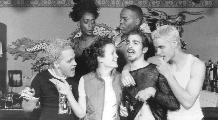SEARCH CurtainUp
TKTS
Letters to Editor
REVIEWS
FEATURES
ADDRESS BOOKS
Broadway
Off-Broadway
DC
NEWS (Etcetera)
BOOKS and CDs
(with Amazon search)
OTHER PLACES
Berkshires
DC (Washington)
London
Los Angeles
QUOTES
FILM
LINKS
MISCELLANEOUS
Free Updates
Masthead
Type too small?
NYC Weather
A CurtainUp Review The Hologram Theory
 Joie Susannah Lee, Michael Alexis Palmer & the "club kids"(Photo: Carol Rosegg) |
When a ghostly Dominic visits Patricia in a dream, she leaves Trinidad and heads to New York to find out if he is really dead and, if so, to give him the burial that will put his soul at rest. Patricia's grim odyssey joins the rituals of Afro-Caribbean religion with those of a group of drugged-out, psychedelically coiffed and costumed club kids in their late teens. They're lost and disoriented that Joe Buck (Chris Messina) their somewhat older "guru" can even seduce them to commit murder.
Patricia's quest and its connection to the club kids is further complicated by alternating sequences involving Simon (Bill Torres), the father of dumb blonde club kid Julian (Daniel Bess) and Sara (KellieOverbey), the half sister of the quivering Mimi (Elizabeth Reaser); also Greg (Corey Stoll) the cop in charge of the case and his possessive fiancée (Jennifer Rau). Under Ruben Polento nervously paced direction the cinematic cross-cutting with its flashing disco lights and hard-driving music, has a look and feel clearly designed to reel in viewers who are the playwright's contemporaries (she's 27) instead of the more traditional older audiences.
Unfortunately, this is a clever idea that underestimates its target audience's ability to cut through the sound and fury and recognize the play's rambling excesses. The performances fail to be truly cutting edge.
Joie Susannah Lee, while a physically expressive Patricia, fails to project her voice or a consistent Trinidadian accent. The club kids never get beneath their garish surface appearance. Corey Stoll is likeable enough as the cop but it falls to Jennifer Rau in the most peripheral role of his girl friend to deliver the best lines and performance. As Patricia tries to piece together her brother's story and also collect the pieces of his body to bury, Kellie Overbey is her not particularly sympathetic journalistic counterpart in unpuzzling the mystery.
Bill Torres as Julian's movie mogul father has the thankless task of explaining the title theory that is the overriding metaphor of the play. When Patricia during an interview-seduction scene asks him if he feels guilty using other people's stories he declares: "I subscribe to the hologram theory of life. . .we are all pieces of the whole. . .in this world, this life, my stories are your stories, yours are mine. We are all a part of the whole."
The hologram theory obviously extends to the symbolism of the other pieces of the mystery -- the pieces in these young killers' past contributing to their deterioration and the pieces of the body that will be whole again once buried. Too bad that Ms. Goldberg, though an imaginative writer, isn't as yet an adept enough juggler to balance the many pieces of her play.
| THE HOLOGRAM THEORY
By Jessica Goldberg Directed by Ruben Polendo Cast: Joie Susannah Lee, Daniel Bess, T.R. Knight, Chris Messina, Kellie Overbey, Michael Alexis Palmer, Jennifer Rau, Elizabeth Reaser, Corey Stoll, Bill Torres Set Design: Scott Spahr Co-Set and Lighting Design: Ryan M. Mueller Costume Design: Carol Bailey Original Music and Sound Design: Ray Sweeten Running time: 2 hours and 20 minutes including one intermission Blue Lights Theater Company at McGinn/Cazalle, above the Promenade (Broadway/76th), 279-4200 3/17/2000-4/09/2000; opening 3/27/200 Reviewed by Elyse Sommer based on March 23rd performance |
